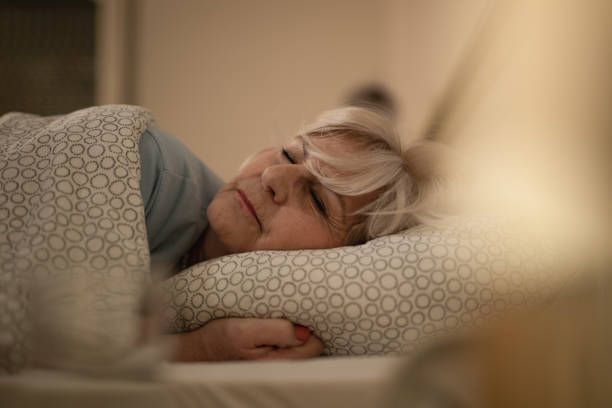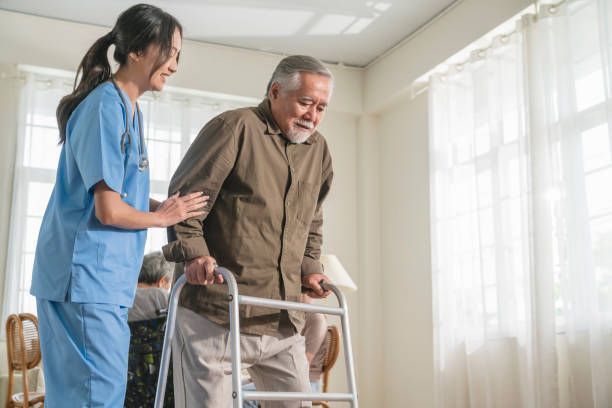Why Do Some Elderly People Sleep So Much?
Why Do Some Elderly People Sleep So Much?
At 7 Day Home Care, we understand that many elderly people experience increased sleep due to a variety of factors such as changes in sleep architecture, chronic health conditions, medication side effects, and mental health issues like depression and anxiety. This excessive sleep can impact their ability to maintain an active and fulfilling lifestyle. Our dedicated caregivers play a crucial role in helping elderly individuals remain independent in the comfort of their own homes by addressing these challenges comprehensively. By creating a supportive and nurturing environment, we help our clients achieve better sleep patterns and maintain their independence and quality of life. 7 Day Home Care is licensed by the New York State Department of Health to provide home care services in Manhattan, Queens, Brooklyn, Nassau County, and Suffolk County, New York.

Elderly People Tend to Sleep More Based on
Medical, Psychological and Lifestyle Factors
As people age, their sleeping patterns and needs often change, leading many elderly individuals to sleep more than they did in their younger years. This phenomenon can be perplexing and concerning for family members and caregivers. At 7 Day Home Care, we understand the importance of addressing these changes comprehensively, focusing on both the underlying causes and potential solutions. This detailed article explores why elderly people tend to sleep so much, considering medical, psychological, and lifestyle factors, and offers insights into how to manage these changes effectively.
Understanding the Sleep Patterns of the Elderly
Natural Changes in Sleep with Age
Aging naturally affects sleep architecture, the structure, and pattern of sleep over the course of a night. As people age, they experience:
- Decreased Sleep Efficiency: Older adults often spend more time in bed but less time asleep. This reduced sleep efficiency can lead to fragmented sleep and more frequent awakenings during the night.
- Altered Sleep Stages: There is a shift towards lighter sleep stages (N1 and N2) and a decrease in deep sleep (N3) and REM sleep, which are crucial for restorative rest.
- Changes in Circadian Rhythm: The body’s internal clock, or circadian rhythm, tends to advance with age, leading to earlier sleep and wake times. This can cause elderly individuals to feel sleepy in the early evening and wake up very early in the morning.
Common Medical Conditions Affecting Sleep
Several medical conditions prevalent among the elderly can significantly impact sleep patterns, including:
- Chronic Pain: Conditions like arthritis, neuropathy, and back pain can make it difficult to fall and stay asleep.
- Sleep Apnea: This condition, characterized by interrupted breathing during sleep, is more common in older adults and can lead to excessive daytime sleepiness.
- Restless Leg Syndrome (RLS) and Periodic Limb Movement Disorder (PLMD): These disorders cause uncomfortable sensations in the legs and involuntary movements, disrupting sleep.
- Heart Disease and Respiratory Disorders: Conditions such as congestive heart failure and chronic obstructive pulmonary disease (COPD) can lead to difficulties in breathing and poor sleep quality.
Psychological Factors and Sleep
Mental health issues can also play a significant role in excessive sleep among the elderly:
- Depression: Depression is common in older adults and can lead to both insomnia and hypersomnia (excessive sleeping).
- Anxiety: Anxiety can cause fragmented sleep and contribute to overall fatigue and increased need for rest.
- Cognitive Decline: Dementia and Alzheimer’s disease often disrupt normal sleep patterns, leading to increased napping and irregular sleep schedules.
Medication Side Effects with Respect to Sleep
Many elderly individuals take multiple medications for various health conditions, and some of these medications can affect sleep:
- Sedatives and Tranquilizers: Medications used to treat anxiety and insomnia can lead to drowsiness and increased sleep.
- Antidepressants: Certain antidepressants can cause drowsiness as a side effect.
- Antihistamines: Commonly used to treat allergies, these medications can also cause drowsiness.
Lifestyle, Environmental Factors and Sleep
Several lifestyle and environmental factors can contribute to increased sleep in the elderly:
- Reduced Physical Activity: Lack of exercise can lead to lower energy levels and increased sleepiness.
- Social Isolation: Loneliness and lack of social engagement can contribute to depression and increased need for sleep.
- Poor Sleep Environment: Factors such as an uncomfortable mattress, noise, and light can impact sleep quality, leading to compensatory daytime sleep.
Managing Increased Sleep in the Elderly
Medical Interventions and Sleep
- Addressing Underlying Health Conditions: Proper management of chronic pain, heart disease, respiratory disorders, and other health conditions can improve sleep quality.
- Evaluating Medications: Reviewing medications with a healthcare provider to identify and address those that may contribute to drowsiness or poor sleep.
- Treating Sleep Disorders: Professional diagnosis and treatment of sleep disorders such as sleep apnea, RLS, and PLMD are crucial. This might involve CPAP machines for sleep apnea or medications for RLS and PLMD.
Psychological Support and Sleep
- Counseling and Therapy: Cognitive-behavioral therapy (CBT) can be effective for treating depression and anxiety, which can, in turn, improve sleep patterns.
- Support Groups: Participation in support groups can help alleviate feelings of isolation and depression, promoting better sleep.
Lifestyle Modifications Related to Sleep
- Encouraging Physical Activity: Regular exercise can improve sleep quality and overall energy levels. Activities such as walking, swimming, or yoga are beneficial.
- Promoting Social Engagement: Encouraging participation in social activities, hobbies, and community events can combat loneliness and improve mental health.
- Establishing a Sleep Routine: Creating a consistent sleep schedule, even on weekends, can help regulate the body’s internal clock.
- Optimizing the Sleep Environment: Ensuring a comfortable mattress, controlling noise and light levels, and maintaining a cool room temperature can enhance sleep quality.
Nutrition and Hydration
- Balanced Diet: A healthy diet can influence energy levels and sleep patterns. Foods rich in tryptophan, such as turkey, nuts, and dairy, can promote better sleep.
- Hydration: Adequate hydration is important, but it’s best to limit fluids close to bedtime to reduce nighttime awakenings.
Cognitive and Behavioral Strategies
- Relaxation Techniques: Practices such as deep breathing, meditation, and progressive muscle relaxation can help reduce anxiety and promote better sleep.
- Limiting Naps: Encouraging shorter and earlier naps can help prevent disruption of nighttime sleep.
The phenomenon of elderly individuals sleeping more than they did in their younger years can be attributed to a combination of natural aging processes, medical conditions, psychological factors, medication side effects, and lifestyle influences. At 7 Day Home Care, we emphasize the importance of a comprehensive approach to managing these changes, which includes medical interventions, psychological support, lifestyle modifications, and creating an optimal sleep environment.
Understanding and addressing the root causes of increased sleep can significantly improve the quality of life for elderly individuals, helping them maintain their independence and well-being. By staying informed and proactive, caregivers and family members can provide the necessary support to ensure that their loved ones enjoy a restful and rejuvenating sleep, contributing to overall health and happiness. To learn more about our home care services near you in New York, please call 516-408-0034 for a free consultation.
Brian Callahan
7 Day Home Care


Living With Parkinson’s Disease: How In-Home Care Helps Seniors Stay Safe, Independent & Comfortable








